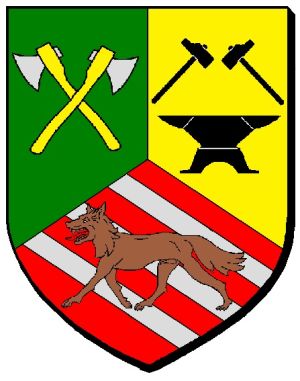La Chapelle-du-Bard: Difference between revisions
Knorrepoes (talk | contribs) m (Text replacement - "{{fr}}" to "") |
Knorrepoes (talk | contribs) m (Text replacement - "{{fr1}}↵{{media}}" to "{{fr1}} {{media1}}") |
||
| Line 28: | Line 28: | ||
{{fr1}} | {{fr1}} | ||
{{ | {{media1}} | ||
[[Category:French Municipalities C]] | [[Category:French Municipalities C]] | ||
[[Category:Isère]] | [[Category:Isère]] | ||
[[Category:Granted 2018]] | [[Category:Granted 2018]] | ||
Revision as of 10:04, 26 December 2022
LA CHAPELLE-DU-BARD
Département : Isère
| French |
iercé en pairle renversé: au 1er de sinople à deux haches de bûcheron d'argent, emmanchées d'or et passées en sautoir, au 2e d'or à l'enclume de sable surmontée de deux marteaux du même, celui de dextre posé en barre et celui de senestre en bande, les tables tournées vers l'enclume, au 3e de gueules à trois bandes d'argent et au loup marchant de tenné, langué de gueules, allumé d'argent et brochant sur les bandes. |
| English | Chapelle-du-Bard No blazon/translation known. Please click here to send your (heraldic !) blazon or translation |
Origin/meaning
The arms were officially adopted in 2018.
he two intersecting axes refer to the importance of forestry. The two hammers and the anvil refer to the local forges, and metal and iron working has been done here for the last 25 centuries.
The wolf is one of the two symbols of Saint Blaise the patron saint of the parish of La Chapelle du Bard. The white and red bands are those of the Barral family, lords of the region in the 18th century and also masters of forges.
Literature: Image from http://www.armorialdefrance.fr
